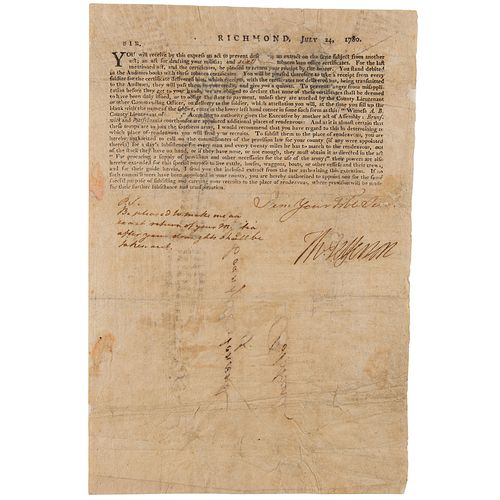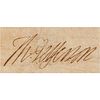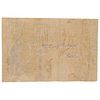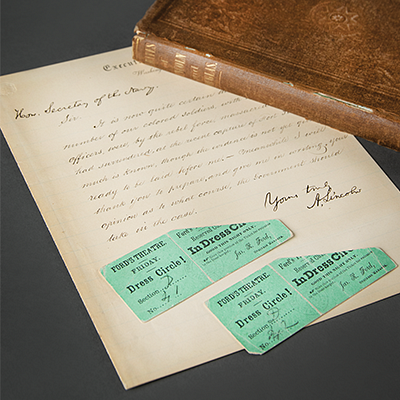Thomas Jefferson Revolutionary War-Dated Document Signed for Drafting and Payment of Virginia State Militia (Sole Surviving Copy)
Two ways to bid:
- Leave a max absentee bid and the platform will bid on your behalf up to your maximum bid during the live auction.
- Bid live during the auction and your bids will be submitted real-time to the auctioneer.
Bid Increments
| Price | Bid Increment |
|---|---|
| $0 | $5 |
| $50 | $10 |
| $200 | $25 |
| $500 | $50 |
About Auction
Sep 23, 2023
RR Auction support@rrauction.com
- Lot Description
Rare Revolutionary War-dated partly-printed DS as governor of Virginia, signed “Th: Jefferson,” one page, 8 x 12, July 24, 1780. Circular letter to the County Lieutenant of Botetourt, referring to acts to prevent desertion, to draft more state militia, and to use tobacco loan certificates for pay. In full: "You will receive by this express an act to prevent dese[rtion]; an extract on the same subject from another act; an act for drafting your militia; and sixt[y] tobacco loan office certificates. For the last mentioned act, and the certificates, be pleased to return your receipt by the bearer. You stand debited in the Auditors books with these tobacco certificates. You will be pleased therefore to take a receipt from every soldier for the certificate delivered him, which receipts, with the certificates not delivered but, being transmitted to the Auditors, they will pass them to your credit, and give you a quie[tu]s. To prevent danger from misapplication before they get to your hands, we are obliged to declare that none of these certificates shall be deemed to have been duly issued, or to oblige the state to payment, unless they are attested by the County Lieutenant or other Commanding Officer, on delivery to the soldier, which attestation you will, at the time you fill up the blank with the name of the soldier, enter in the lower left hand corner in some such form as this: 'Witness A.B. County Lieutenant of ___.' According to authority given the Executive by another act of Assembly: Brunswick and Pittsylvania courthouses are appointed additional places of rendezvous: And as it is almost certain that these troops are to join the southern army, I would recommend that you have regard to this in determining to which place of rendezvous you will send your recruits. To subsist them to the place of rendezvous, you are hereby authorized to call on the commissioners of the provision law for your county (if any were appointed therein) for a day’s subsistence for every man and every twenty miles he has to march to the rendezvous, out of the stock they have on hand, or if they have none, or not enough, they must obtain it as directed in the act 'For procuring a supply of provisions and other necessaries for the use of the army;' their powers are also hereby extended for this special purpose to live cattle, horses, waggons, boats, or other vessels and their crews; and for their guide herein, I send you the inclosed extract from the law authorizing this extention. If no such commissioners have been appointed in your county, you are hereby authorized to appoint one for the same special purpose of subsisting and carrying your recruits to the place of rendezvous, where provision will be made for their further subsistance and transportation." The complimentary closing ("I am Your hble Servt") and postscript ("P.S. Be pleased to make me an exact return of your M[ili]tia after your draughts shall be taken out") are penned in clerks' hands. Professionally repaired and restored to very good condition, with overall creasing, light staining, and silk reinforcements on the reverse to some of the ink erosion.
In The Papers of Thomas Jefferson, this document is described as 'apparently the sole surviving copy of a circular sent to many if not all of the county lieutenants.' The significant circular demonstrates Jefferson's keen guidance of the Virginia state militia during the Revolutionary War, ensuring that the troops remained adequately paid and supplied in spite of wartime shortages. In April 1780, Jefferson had transferred Virginia's capital from Williamsburg further inland to Richmond—from where he issued this circular—in order to protect the state's government from a coastal attack. However, Jefferson's efforts to protect the capital proved insufficient in the face of the ambitious traitor Benedict Arnold. In December 1780, Arnold led a force of 1,600 troops up the James River, laying waste to plantations and settlements along the way, and captured Richmond unopposed, burning much of the city. Governor Jefferson, forced to flee the city, ordered his friend, Sampson Mathews, to assault Arnold's troops with a meager corps of 200 militiamen. Using guerrilla tactics, Mathews' men inflicted enough damage to Arnold's troops that they were forced to retreat. - Shipping Info
-
Bidder is liable for shipping and handling and providing accurate information as to shipping or delivery locations and arranging for such. RR Auction is unable to combine purchases from other auctions or affiliates into one package for shipping purposes. Lots won will be shipped in a commercially reasonable time after payment in good funds for the merchandise and the shipping fees are received or credit extended, except when third-party shipment occurs. Bidder agrees that service and handling charges related to shipping items which are not pre-paid may be charged to a credit card on file with RR Auction. Successful international Bidders shall provide written shipping instructions, including specified Customs declarations, to RR Auction for any lots to be delivered outside of the United States. NOTE: Declaration value shall be the item’(s) hammer price and RR Auction shall use the correct harmonized code for the lot. Domestic Bidders on lots designated for third-party shipment must designate the common carrier, accept risk of loss, and prepay shipping costs.
-
- Buyer's Premium



 EUR
EUR CAD
CAD AUD
AUD GBP
GBP MXN
MXN HKD
HKD CNY
CNY MYR
MYR SEK
SEK SGD
SGD CHF
CHF THB
THB













